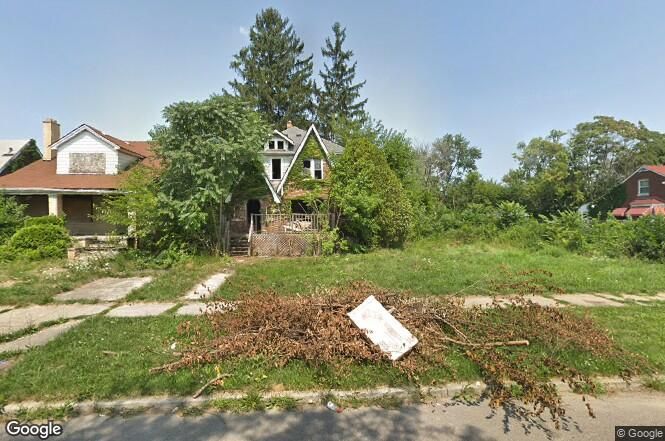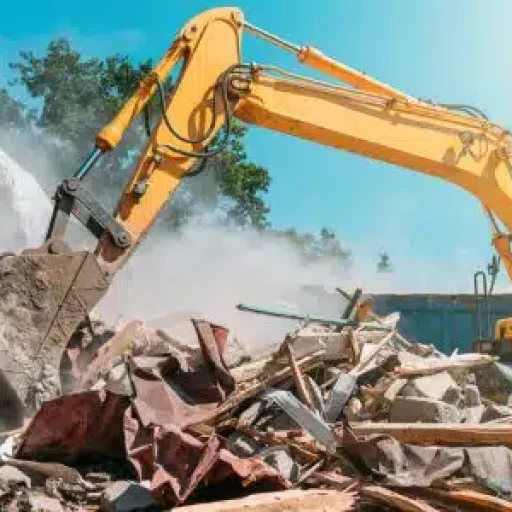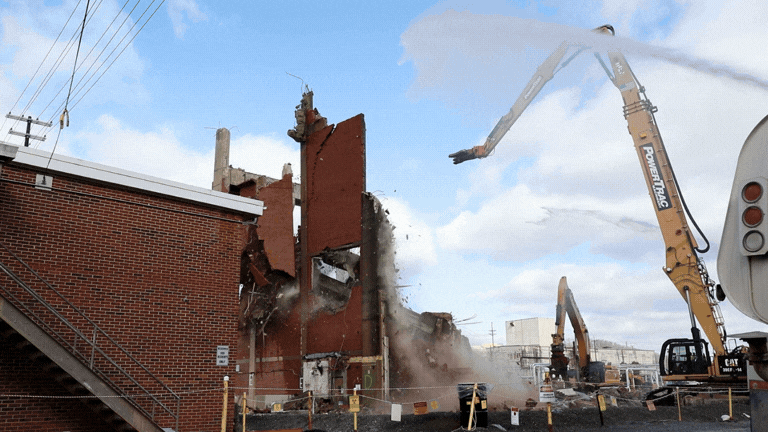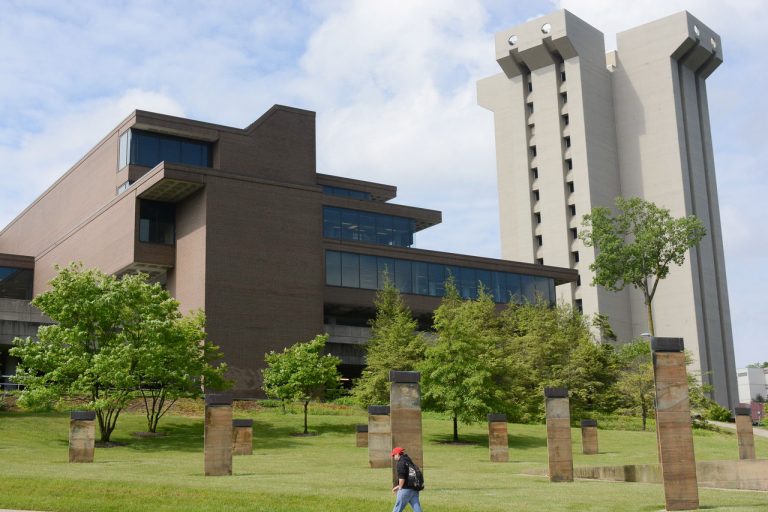
Detroit City Council members admonished agency officials who oversee the city’s demolition program Thursday, saying they misled the public about safeguards uncovering a scheme last week where a contractor allegedly tore down homes and buried the debris instead of properly disposing of the materials.
Officials have moved to permanently ban the out-of-state demolition company from any future work in Detroit, but revelations regarding the scheme have pushed at least one top Detroit official into trying to get direct oversight of the blight removal program returned to city officials.
The issue first surfaced Tuesday when the Free Press published an investigation that revealed Chicago-based McDonagh Demolition Inc. was at risk of losing more than $15 million in scheduled work because of the accusations, which are a major violation of the federally funded program.
The city has defended its demolition process in recent weeks, and again Thursday, in response to concerns raised regarding proper abatement and backfill practices within the program.
Detroit Building Authority Special Projects Director Brian Farkas originally told the Free Press that an on-site DBA field liaison discovered McDonagh “filled several demolition holes before fully removing all of the demolition debris” and credited the agency’s internal quality control measures. However, it wasn’t clear how the employee discovered the problem.
Multiple sources told the Free Press earlier this week that the city was actually alerted to the situation by a whistleblower, a former McDonagh employee, who shared photos of discarded debris buried at demolition sites. The city declined comment at the time on that detail, citing the open investigation.The city’s demolition program is jointly overseen by the DBA and Detroit Land Bank Authority.
The question was raised during the council’s Planning and Economic Committee meeting Thursday by Councilman James Tate, who chairs the committee, and reiterated by Council President Pro Tem Mary Sheffield, who implored Farkas to state on the record how the city actually discovered the alleged scheme.
“I just want clarity on how it was uncovered. … I think it is important for public transparency purposes that we’re honest at the table,” Sheffield said, adding that through her own investigation she found out about the whistleblower employee. “So if it was not you all who caught it, it should be known that it wasn’t.”
Farkas admitted at the table that indeed an “ex-employee of McDonagh did tip off one of our field liaisons.” As a result, at least four properties have been identified.
“So that’s a huge difference, that’s a huge problem,” Sheffield said. “You have open hole verification, you have this new system that you just ran off about with a five-page presentation and none of it caught it? None of it caught a house being buried? I think that the pace at which this program is moving, the protocols that are in place are not sufficient, period.”
Tate also questioned why council members had to find out about the incident through the news media, instead of being notified directly by the DBA and Land Bank.
“One of my main concerns is about the communication of suspended contractors,” Tate said. “Many times, pretty much every time, we’re finding out once there’s an article in the newspaper as opposed to finding out this information in advance. It’s almost as if we’re on a need-to-know basis. Council is actually providing dollars to help support payments for these contractors. … So we actually have a reason to have a complaint.”
Farkas apologized and stated that moving forward the DBA will generate weekly reports for City Council regarding any contractor issues.
Detroit’s Ombudsman Bruce Simpson, whose office is independent and investigates complaints from residents, said he is preparing a report on the company and alluded to other issues that have been raised by laborers who have worked for McDonagh.
“This company does not just have problems as it relates to the scam that they tried to pull off on the City of Detroit and I’m glad we’re coming down on them very hard, but within a span of 100 days or less that they came into the city, information has been provided to me about their conduct as it relates to the treatment of laborers,” Simpson said, adding that the situation is “very troubling.”
Simpson also raised concerns about a gap in oversight when demolitions occur because DBA liaisons are only present during part of the process.
“The pace at which we are demolishing homes and the health and safety of the citizens of the city of Detroit, which I’m concerned about, those two things cannot coexist when you move that fast,” Simpson said. “You lose sight of certain things and mistakes are made. … The DBA liaison is not on-site for the full process. … Those were pictures provided by a former employee of the company. That is the only reason we know. The problem with that is, how many times has it happened and we don’t know?”
Farkas said the city currently has seven liaisons, an increase from when there were just two overseeing the entire program when it first began in 2014. But some council members said that isn’t enough.
“To have two field inspectors in the beginning of this program, you grossly underestimated the kind of workload we have as it relates to the administration’s goal of tackling this blight problem,” said Councilman Gabe Leland. “Detroit cannot become another Flint. I know you don’t want to hear that. I know the feelings and emotions that brings but we have to have more oversight and more eyes on the street.”
The incident has sparked an internal review of every demolition — 90 in total — that the company has performed in Detroit. Of the 90 demolitions, the city said 54 have yet to be backfilled and are currently open holes.
Officials confirmed late Thursday that as part of its review of the company’s demolitions, it found potentially asbestos-containing materials at a site located at 10977 Rossiter. Old vinyl floor tiling, which was found, can contain asbestos.
“As DBA staff oversaw the removal of backfill, three small pieces of what appeared to be vinyl floor tile — approximately one square foot each — were observed several feet below the surface,” Farkas said in an email, adding it has been “removed from the site and properly disposed of as it should have been originally.”
A Free Press review of McDonagh demolition projects also found a half dozen that were well above the $25,000 ceiling for federal dollars. At least two were more than $40,000, according to city records.
Farkas said Thursday that the city has started the process of revoking the company’s wrecking license and that the company stands to lose $15 million in awarded work and $2 million in work that was completed.
“This attempted scheme will cost McDonagh $17 million in awarded work,” Farkas said. “McDonagh is not going to do work in the city of Detroit. This attempted scheme is the most egregious I’ve seen in the city.”
The city said it believes the company was attempting to “cut corners” and save $1,000 in costs per house by burying the debris, instead of removing it properly.
Farkas said the city’s Office of Procurement, which helps awards contracts on city-funded demolitions, will also be reporting the incident to the National Procurement Clearing Houses.
“Other agencies need to know about what happened here in Detroit,” Farkas said.
Land Bank Demolition Director Tammy Daniels said the agency also has prevented the company from winning any additional work.
“They bid on an additional $14 million worth of work, which they’ve been precluded from winning,” Daniels said.
The Michigan Homeowner Assistance Nonprofit Housing Corp. administers the federal Hardest Hit Fund program that funds Land Bank demolitions and has disbursed more than $176 million in funds to Detroit, which has the largest demolition program of its kind in the nation. On Monday, MHA characterized the situation as a “clear violation” of its blight manual that dictates the rules of the state’s blight program.
The Land Bank is in the process of seeking an amended and restated Memorandum of Understanding with the city to extend its current contract enabling it to perform services for the city — including demolition — to 2023. Its current MOU doesn’t expire until June 30, 2020. The planning committee, for at least a second time, Thursday pushed back considering the MOU for an additional two weeks in light of recent concerns raised by members and the public.
Meanwhile, calls for more oversight of the city’s demolition have grown within the past few weeks.
McDonagh’s demolitions have raised new environmental questions that come just two weeks after a Free Press investigation reported that contaminated and unverified dirt was potentially used to fill demolition sites across Detroit.
Dirt usage is the focus of a widening federal criminal probe of the city’s federally funded demolition program.
The Special Inspector General for the Troubled Asset Relief Program is also probing whether some companies used free dirt obtained from a variety of unverified sources and then passed it off as an approved residential dirt source before billing the demolition program for materials they never actually paid for.
Sheffield questioned Thursday how many sites potentially have unverified sources of dirt, saying she was informed it may total “thousands.”
Farkas said, prior to switching to a digital dirt tracking system, the city only tracked sources of dirt via paper documentation — including load tickets — submitted by contractors. Farkas said a random check of 13 older properties resulted in the city finding source information for those specific holes, but questions remain.
The investigation led state Rep. LaTanya Garrett to call for state-level hearings to discuss the “alarming” findings and spurred Sheffield to request a congressional hearing be held. Sheffield’s request was sent to U.S. Reps. Rashida Tlaib and Brenda Lawrence.
Garrett will be formally introducing a resolution calling for the hearings next Tuesday. She officially filed it with the Clerk of the House on Thursday in Lansing. Garrett told the Free Press on Thursday that with “each passing day, new stories arise detailing alleged mismanagement of federal demolition funds” awarded to the Detroit Land Bank.
“In the spirit of transparency and open government, it is imperative that the residents of the state of Michigan and the city of Detroit get accurate answers to their questions pertaining to the operations of the Detroit Land Bank and Building Authorities,” Garrett said in a statement. “The resolution I introduced today seeks to have the House Oversight and House Government Operations Committees hold hearings.”
Meanwhile, Sheffield has called for direct oversight of the demolition program to be returned to the city and removed from the oversight of the Land Bank and DBA.
Agency officials pushed back on the notion of removing it from their control, saying the city would lose between $46 and $90 million in federal funds. However, the HHF program is set to sunset by the end of next year.
A handful of community members, including Detroit Charter Commission member Joanna Underwood, who has also called for oversight to return to the city, raised concerns about the Land Bank.
“I think you city council members have been totally left out of the loop,” Underwood said. “At this point, the Land Bank is endangering the public. … We cannot continue to allow this travesty to go on. The Land Bank contract cannot be renewed. It has been a disaster. The demolition program is a failed program and the City of Detroit should not fund it anymore. … This is on you guys (council) to make the right decision.”
Kat Stafford writes enterprise and investigative stories about Detroit. Contact her: ks*******@*******ss.com or 313-223-4759. To read previous coverage of demolition issues go to reep.com/news/investigations/






